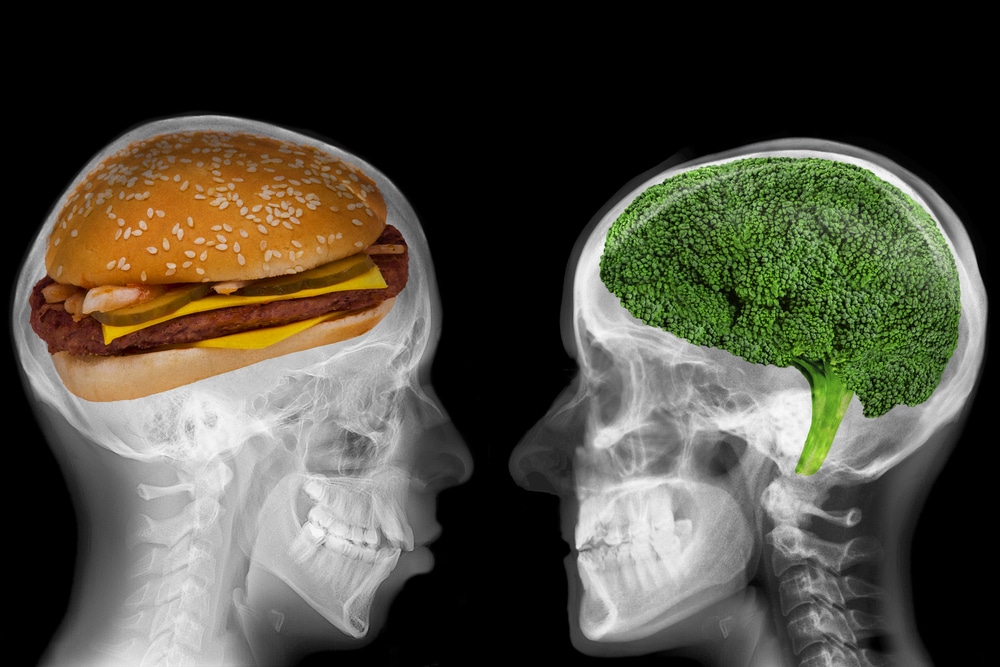You are what you eat. It’s a cliché phrase that most of us have heard but probably have not put much thought into. We know that certain types of diets can lead to health problems, such as obesity, diabetes, and high cholesterol, but did you know that what you eat can also have an impact on your brain? Which, in turn, can have affect your mood, energy level, and cognitive functioning?
Historically, nutritional science has not been emphasized in the study of psychiatric or neurologic conditions. It has only been within the last few years that we are beginning to have a better understanding of the relationship between nutrition and the brain. The following lists just a few tidbits of information to demonstrate the importance of food on our brain functioning.
Food and the Developing Brain
Nutritional deficiencies in childhood could have an impact on the developing brain. For example, iron deficiencies and lack of essential fatty acids have been associated with poor myelination of brain cells[1], which could lead to problems with processing speed and attention. Studies have also shown that children diagnosed with ADHD also have a very high rate of magnesium deficiency. In one study, 95% of the ADHD group tested had a magnesium deficiency! [2] Thus, ensuring proper nutrition in children exhibiting behavioral or cognitive problems is an essential first step before moving to more drastic measures such as prescribing controller prescription medications.
Food and the Adult Brain
A healthy diet still has its uses in the adult brain. Our brain is a very busy organ that is not only in charge of our thinking processes and feelings but sending signals to the rest of our body to control its functioning. The brain requires a lot of energy to run, and the source of that energy is largely in the food that we eat. Just as putting in high-grade gasoline can keep a car running efficiently in the long-term, the quality of the food that we eat will also maximize our brain health.
It is important to eat a wide variety of food that provides all the essential nutrients that our bodies need to function efficiently. A poor diet lacking in certain nutrients can lead to “brain fog” symptoms such as fatigue, difficulties concentrating, and slower processing. We have all experienced these symptoms to some degree (think to when you last tried to do something cognitive complex while on an empty stomach!)
Furthermore, nutritional deficiencies have been associated with a number of different neuropsychological symptoms. For example. vitamin D and vitamin B (particularly B12)[3] deficiencies are associated with depression as well as cognitive impairment.[4] However, too much of a mineral can also lead to problems, as this often leads to development of free radicals that can damage cells. Iron toxicity has been associated with neurodegenerative diseases like Alzheimer’s disease or Parkinson’s disease.[5]
Preventing Risk Factors for Cerebrovascular Disease
Using the analogy of food as fuel, think of your blood vessels as the pumps that are feeding your brain. Diets that are high in unhealthy fats can lead to clogging of those pumps which can lead to reduced blood and oxygen flow to the brain over time. Likewise, too much protein or too much glucose in the bloodstream can also lead to oxidation and hardening of blood vessels over time, which narrows the pathways for blood flow. This is why hypertension is considered to be the biggest risk factor for strokes. Diabetes and high cholesterol are other conditions that can lead to cerebrovascular changes over time. A proper diet to reduce these risk factors is vital.
Special Diets to Prevent Neurological Symptoms
In general, a balanced diet with lots of vegetable varieties, complex carbohydrates, and healthy fats is best for our general physical and brain health. However, some people may require a different ratio of macronutrients (proteins, fats, carbohydrates) to help with specific health conditions. For example, several studies have shown that keto diets may be effective in preventing seizures in children with epilepsy.[6] More recent studies are also looking into ketones providing a neuroprotective effect against neurodegenerative conditions, such as Alzheimer’s disease, though this is still up for debate.[7] However, it is cautioned that a ketogenic diet can lead to deprivation of nutrients that would be found in a more balanced diet. Consideration of starting a keto diet should be discussed with one’s physician and ideally a dietitian to determine a healthy meal plan.
The Microbiome
Most recently, there has been an explosion of research investigating the microbiome, which is the universe of bacteria that lives within our bodies. These bacteria outnumber our human cells, and they play a role in digestion and the immune system. Gut bacteria imbalances have been associated with inflammatory conditions such as irritable bowel disease.[8]
Furthermore, we have learned that there is bidirectional communication between the gut and the brain through several different pathways. Studies have suggested that, at least in rats, certain bacteria found in the gut appears to influence the development of emotional behavior, stress- and pain-modulation systems, and brain neurotransmitter systems.[9] Further research is being conducted on how this translates to human beings.
In short, science is finally catching up to examine the interconnection between nutrition with neuropsychiatric conditions. There is still much to learn, but it is apparent that what we eat can have profound effects on our general health, which includes our brain!
Nutritional Counseling at PNBC
Nutrition is something that is often overlooked that we at PNBC feel is important to include as part of a comprehensive treatment plan for neuropsychological conditions. We are happy to announce that we will soon be offering nutritional counseling services with a registered dietitian (RD) who will work in tandem with our psychologists and therapists.
Written by Delia Silva, PsyD, ABPP-CN. Dr. Silva is a board-certified neuropsychologist and owner of Pacific Neurobehavioral Clinic.
Subscribe to our newsletter to get e-mails when new posts such as this one come out, and for news about happenings at Pacific Neurobehavioral Clinic, PC.
[wpforms id=”3591″ title=”false” description=”false”]
[1] Yehuda, S., Rabinovitz, S., & Mostofsky, D. I. (2006). Nutritional deficiencies in learning and cognition.
[2] Kozielec, T., & Starobrat-Hermelin, B. (1997). Assessment of magnesium levels in children with attention deficit hyperactivity disorder (ADHD). Magnesium Research, 10(2), 143-148.
[3] Oh, R., & Brown, D. L. (2003). Vitamin B12 deficiency. American family physician, 67(5), 979-986.
[4] Etgen, T., Sander, D., Bickel, H., Sander, K., & Förstl, H. (2012). Vitamin D deficiency, cognitive impairment and dementia: a systematic review and meta-analysis. Dementia and geriatric cognitive disorders, 33(5), 297-305.
[5] Altamura, S., & Muckenthaler, M. U. (2009). Iron toxicity in diseases of aging: Alzheimer’s disease, Parkinson’s disease and atherosclerosis. Journal of Alzheimer’s Disease, 16(4), 879-895.
[6] Levy, R. G., Cooper, P. N., Giri, P., & Weston, J. (2012). Ketogenic diet and other dietary treatments for epilepsy. Cochrane database of systematic reviews, (3).
[7] Włodarek, D. (2019). Role of ketogenic diets in neurodegenerative diseases (Alzheimer’s disease and Parkinson’s disease). Nutrients, 11(1), 169.
[8] Morgan, X. C., & Huttenhower, C. (2012). Human microbiome analysis. PLoS Comput Biol, 8(12), e1002808.
[9] Mayer, E. A., Tillisch, K., & Gupta, A. (2015). Gut/brain axis and the microbiota. The Journal of clinical investigation, 125(3), 926-938.

